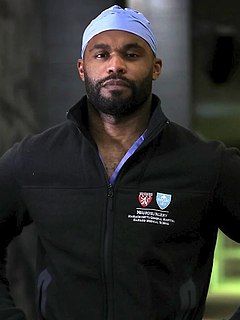A Quote by Bruce Barton
The five steps in teaching an employee new skills are preparation, explanation, showing, observation and supervision.
Related Quotes
[Theory is] an explanation that has been confirmed to such a degree, by observation and experiment, that knowledgeable experts accept it as fact. That's what scientists mean when they talk about a theory: not a dreamy and unreliable speculation, but an explanatory statement that fits the evidence. They embrace such an explanation confidently but provisionally - taking it as their best available view of reality, at least unil some severely conflicting data or some better explanation might come along.
Business requires an unbelievable level of resilience inside you, the chokehold on the growth of your business is always the leader, it's always your psychology and your skills - 80% psychology, 20% skills. If you don't have the marketing skills, if you don't have the financial-intelligence skills, if you don't have the recruiting skills, it's really hard for you to lead somebody else if you don't have fundamentally those skills. And so my life is about teaching those skills and helping people change the psychology so that they live out of what's possible, instead of out of their fear.
I believe in teaching just a few students, as teaching requires a constant alert observation on each individual in order to establish a direct relationship. A good teacher cannot be fixed in a routine, and many are just that. During teaching, each moment requires a sensitive mind that is constantly changing and constantly adapting.
The housewife is an unpaid worker in her husband's house in return for the security of being a permanent employee: hers is the reductio ad absurdum of the employee who accepts a lower wage in return for permanence of his employment. But the lowest paid employees can be and are laid off, and so are wives. They have no savings, no skills which they can bargain with elsewhere, and they must bear the stigma of having been sacked.
While our managers debated what steps to take to address the sales and cash-flow crisis, I began to lead week-long employee seminars in what we called Philosophies. We'd take a busload at a time to places like Yosemite or the Marin Headlands above San Francisco, camp out, and gather under the trees to talk. The goal was to teach every employee in the company our business and environmental ethics and values.
Even your most talented employees have room for growth in some area, and you're doing your employee a disservice if the sum of your review is: 'You're great!' No matter how talented the employee, think of ways he could grow towards the position he might want to hold two, five, or 10 years down the line.



































